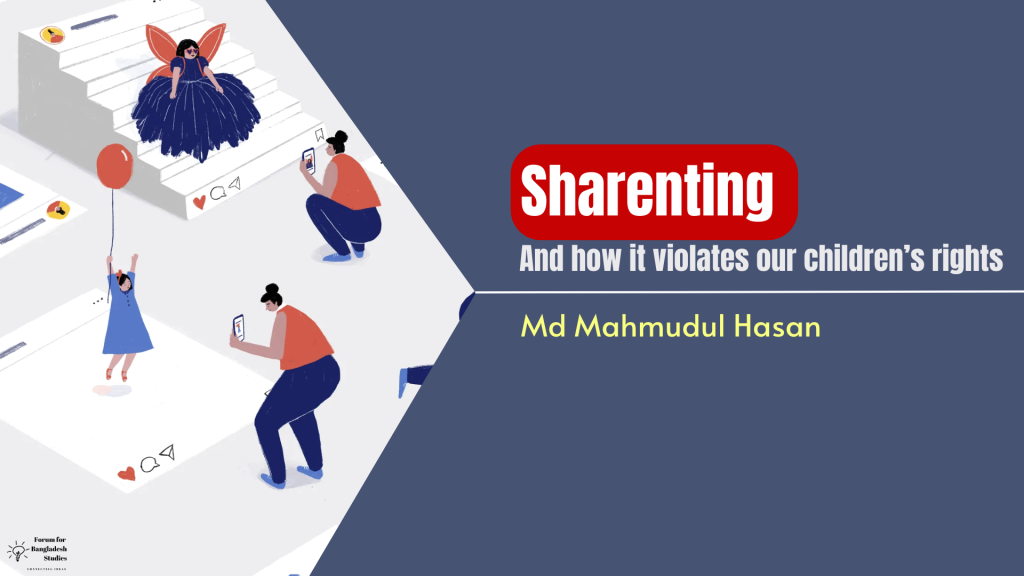The term “sharenting” is believed to have been coined in 2010. It is a portmanteau of (over)sharing and parenting and refers to the practice of parents posting photos and other information about their children on social media platforms. Though widespread and growing, this habit is highly controversial. Many scholars of social media argue that it risks children’s long-term safety and may negatively affect the future relationship with their parents. However, the practice is defended on the grounds that sharenting is an “expression of parental pride” and a way of being happy and increasing happiness.
I am a father of three children, but I have never shared their photos, videos or current statuses on Facebook or other publicly accessible social media. In this respect, I belong to the minority group of social media consumers. However, that didn’t stop photos of some of my children from appearing on my Facebook feed. Others “tagged” me while posting group photos that include my children. Thus, sadly, their images landed on my Facebook page.
The reason why I dissuaded myself from sharenting was instinctive and influenced by my personal taste. Now, in order to write this essay, I did some research, which vindicated and strengthened my confidence that the harms of sharenting greatly outweigh its benefits.
I believe that I don’t have the right to flaunt photos or mementos of my children, and they aren’t at the right age to give me their (informed) consent to do so. To me, it is all about online etiquette, respecting my children’s privacy, protecting their rights and ensuring their security.
What parents usually share online about their children builds a data structure with which the latter may not be happy once they grow up. When we share information on social media platforms, we are conscious of the fact that their owners may use it for commercial purposes. But underage children whose information their parents share on various sites are not aware of these commercial motives. Nor do they understand that owners of social media affordances are involved in data profiling and data trading. Perhaps there are (and/or will be) so many other pitfalls and (privacy) loopholes in social media use, about which we know hardly anything.
This leads us to the question that Linda Geddes asks in a Guardian (UK) article published on September 21, 2014, “But is it safe, or even ethical, to publish something about someone who can’t give their consent? And as the business models of social networking sites change and digital technology develops, could these innocent snapshots someday come back and bite our children on the behind?”
The BBC essay “‘Sharenting’ puts young at risk of online fraud” makes this clearer. Referring to a warning by Barclays Bank (UK), it says that sharenting “will account for two-thirds of identity fraud facing young people by the end of the next decade [2020s] and will cost £667m per year.” According to Barclays, parents “fail to realise they are making their children ‘fraud targets’ in the future, by publishing so much personal information which will remain online.”
Even if a particular piece of information is deleted, does deleting really erase that data from the archives of social media platforms? Arguably, deleting digital data does not delete anything.
What is more important to me is that children are human beings, not objects. They have their likes and dislikes, their predilections and prejudices. Parents are carers of their children, not owners. It is the children’s right to decide what information about themselves they would wish to see stored in metadata repositories; and they will do so once they reach the right age.
Most of us are aware of facial recognition technology (FRT) and its uses and abuses. By the time today’s underage children become adults, such technology will likely be “far more sophisticated and widespread.” Therefore, it will be unsurprising if the algorithm for data mining is advanced to such an extent that one photo of today’s toddler will be enough for the ill-intentioned media owners or fraudsters to steal their identities or to compromise their privacy and security.
The fact of the matter is that, once a parent posts their children’s photos (often even prenatal ultrasound images) or mementos on the internet, they immediately lose control of the digital footprint that is generated on systems and laid down in databases. The multitude of “likes” and “shares” that are placed beneath a status update may take it to places beyond our reach. It is not humanly possible to police all the recipients or to prevent them from forwarding it to others. It is foolish of us to expose ourselves to this peril. But to bring our children to such peril is more than foolishness – it is a violation of their rights and of the trust they place in us.
Let me cite another example. The UK’s Daily Mail on March 11, 2014 ran a story on then UK Prime Minister David Cameron carrying his three-year-old daughter to childcare before rushing to the office to chair a cabinet meeting. Being a father myself, I was touched to see the human side of the prime minister as he was carrying his daughter on his shoulder and walking along the pavement of Whitehall in the morning.
The Daily Mail printed a full-page photo that demonstrates this very human side of the UK prime minister. But, while it ran the full-face photo of Cameron, it blurred the image of his daughter’s face. This is because Cameron or the newspaper does not have the right to expose her identity to the public. Nor was she of the right age to make such a decision. I believe that was the reason why her face was not shown on the newspaper page.
Like Cameron’s daughter, all children on Earth are entitled to this right to privacy, and we must respect it, be it offline or online.
First Published : Daily Star, Jul 6, 2023

